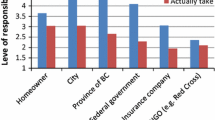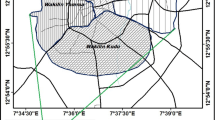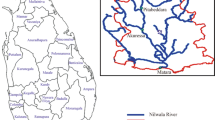Abstract
This paper aims to examine the impact of large-scale structuraladjustments (like the Greater Dhaka Flood Protection Project, GDFPP) on local living environment.It focuses the importance of environmental factors in flood hazard mitigation, and examines theenvironmental attitudes of the floodplain residents arising from the large-scale structural adjustments.Based on `perceived natural hazard research perspectives', this paper examines: (i) the reasons for persistentfloodplain occupation, and (ii) the importance of environmental factors in the choice, motivations and decision-makingof floodplain residents.
This research used data collected from 300 households situated inthe eastern part of Dhaka. The face-to-face household survey data provided individuals' responses to a structuredquestionnaire on hazards and environment. Survey concerned urban floodplains, and looked fordata on housing, household characteristics, and residents' attitudes. Results of interview surveys wereused to: (i) explore the reasons of floodplain occupation, and (ii) residents' attitudes to tolerable levelof flood risk and willingness to accept environmental change resulting from the proposed structural embankments inthe eastern perimeter of Dhaka City, Bangladesh.
Findings revealed that floodplain occupation (by theindividuals' decision-making) was a result of overall reaction to the Government's structuraladjustment policies that resulted from institutional, locational and socio-economic factors. The attitude survey results provided residents' perception to hazards and environment to be dependenton the socio-economic factors – but in a complex manner, many factors are interrelated.In addition to support for structural embankments, the study sample displayed a common concernand widespread environmental awareness. In terms of any `trade-off' between thebenefits (resources) from the embankments and costs (hazards) due to the detrimental impact on environment, the residents of Dhaka, despite some concern forsacrificing embankments for environment, tended to show a generalconsensus for embankments.
Similar content being viewed by others
References
Ajzen, I.: 1988, Attitudes, Personality, and Behavior, Open University Press, Milton Keynes.
BBS (Bangladesh Bureau of Statistics): 1997, 1997‐Statistical Yearbook of Bangladesh, Ministry of Planning, 8th edn, Government of Bangladesh.
Chan, N.W.: 1996, Choice and constraint in floodplain occupation: The influence of structural factors on residential location in peninsular Malaysia, Disasters 19(4), 287–307.
Chowdhury, M. R.: 2000, An assessment of flood forecasting in Bangladesh: The experience of the 1998 flood, Natural Hazards 22(2), 139–163.
Daniel, W. W. and Terrell, J. C. (1929), Business Statistics, Houghton Miffin Co., Boston.
FAP, Flood Action Plan: 1991, Dhaka integrated flood protection, Final report‐FAP 8B, Government of Bangladesh.
Fordham, M. H.: 1992, Choice and Constraints in Flood Hazard Mitigation: The Environmental Attitudes of Floodplain Residents and Engineers, Unpublished Ph.D. thesis, School of Geography and Planning, Middlesex Polytechnic, U.K., 286 pp.
Green, C. H., Tunstall, S. M., and Fordham, M. H.: 1991, The risks from flooding: Which risks and worse perception?, Disasters 15(3), 227–236.
Haque C. E.: 1997, Hazards in a Fickle Environment: Bangladesh, Kluwer Academic Publishers, Dordrecht, 380 pp.
Haque, C. E. and Zaman, M. Q.: 1993, Human responses to riverine hazards in Bangladesh: A proposal for sustainable floodplain development, World Development 21(1), 93–107.
Hayashi, C.: 1950, On the quantification of qualitative data from the mathematico‐statistical point of view, Ann. Inst. Statist. Math. 2, 35–47.
Hayashi, C.: 1952, On the prediction of phenomena from qualitative data on the quantification of qualitative data from the mathematico‐statistical point of view, Ann. Inst. Statist. Math. 3, 69–98.
James, L. D., Laurent, E. A., and Hill, D. W.: 1971, The Floodplain as a Residential Choice: Implication to the Floodplain Management, Environmental Resources Center, Georgia Institute of Technology, Georgia, Atlanta.
JICA: 1992, Feasibility Study on Greater Dhaka Flood Protection Project, Flood Action Plan (FAP) 8A, Government of Bangladesh.
Kates, R. W.: 1962, Hazard and Choice Perception in Floodplain Management, University of Chicago, Department of Geography, Research Paper No. 78.
Muhit, A. M.: 1993, Socio‐economic and environmental impacts of flood control facilities in Dhaka City, Proceedings of UNCRD, (December), Nagoya, Japan.
Nachmias F. C. and Nachimas, D.: 1992, Research Methods in the Social Science, 4th edn, Edward Arnold, London.
Sugiyama, M.: 1987, Multidimensional analysis of opinion survey data, in Chikio Hayashi, Edwin Diday, Michel Jambu, and Noboru Ohsum (eds), Recent Development in Statistical Inference and Data Analysis, Proceedings of the Japanese‐French Scientific Seminar, March 24–26, Academic Press, pp. 343–372.
Tanaka, Y.: 1980, An application of methods of quantification to analyze the effects of qualitative factors, in K. Matusita (ed.), Recent Development in Statistical Inference and Data Analysis, North‐Holland, pp. 287–299.
White, G. F. (ed.): 1974, Natural Hazards–Local, National, Global, Oxford University Press, London.
Author information
Authors and Affiliations
Rights and permissions
About this article
Cite this article
Chowdhury, M.R. The Impact of `Greater Dhaka Flood Protection Project' (GDFPP) on Local Living Environment – The Attitude of the Floodplain Residents. Natural Hazards 29, 309–324 (2003). https://doi.org/10.1023/A:1024798931426
Issue Date:
DOI: https://doi.org/10.1023/A:1024798931426




